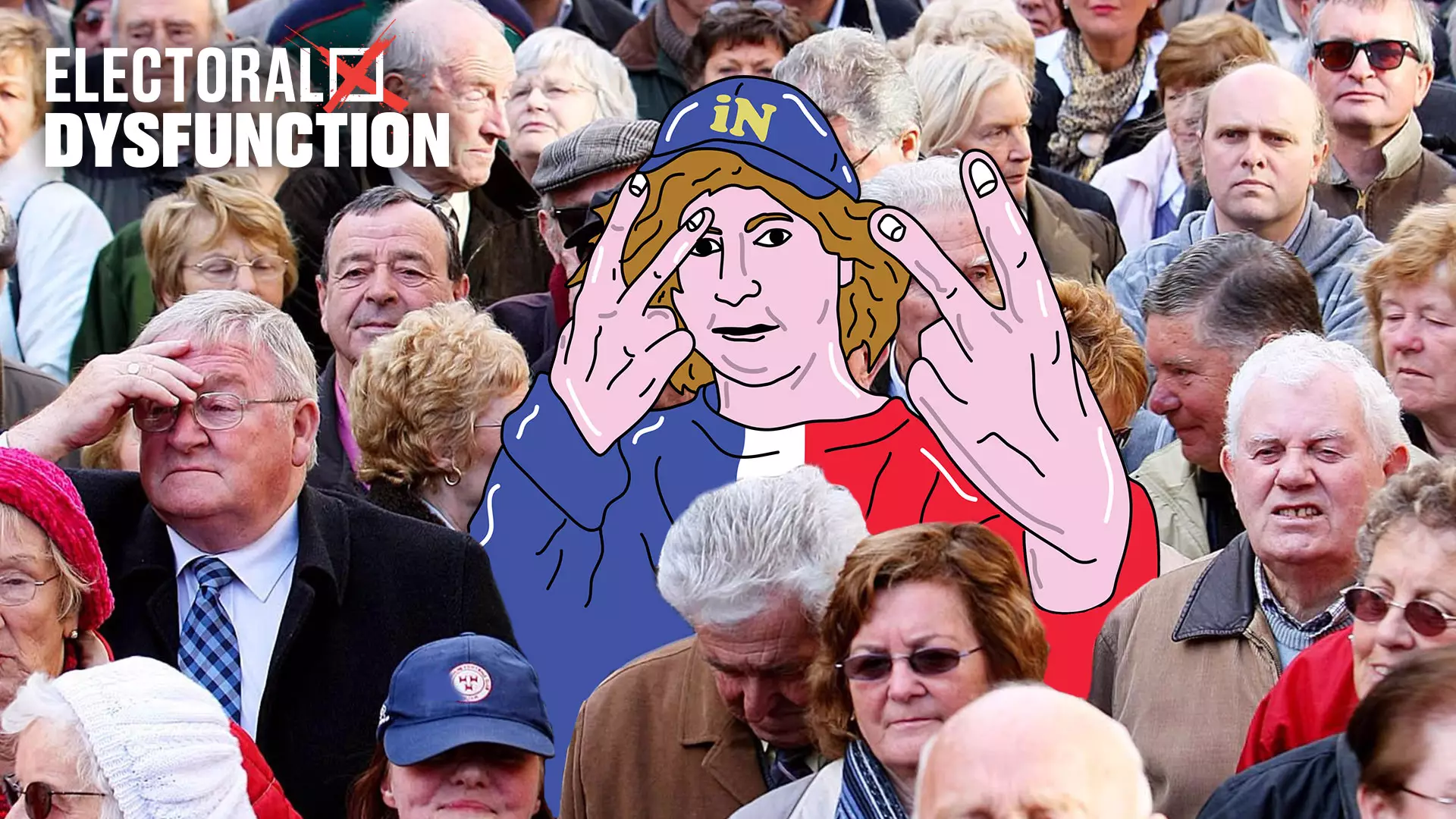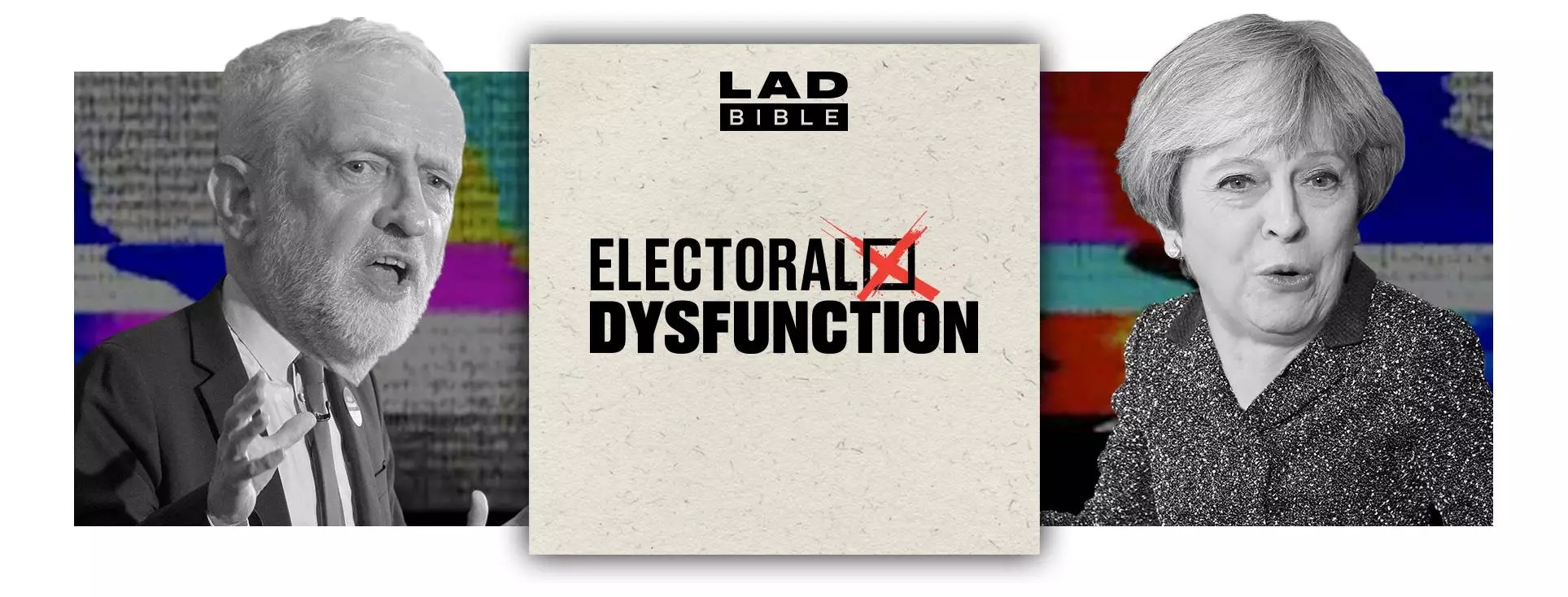
"Under-30s love Corbyn, but they don't care enough to get off their lazy arses and vote for him."
In a recent interview, this is how one anonymous candidate - who has served as an MP for more than a decade - described the voting situation among young people ahead of the General Election.
Although the comment has proven controversial, it is undeniable that there's some truth to it. Historically, young people have failed to turnout in the same numbers at other age demographics.
Advert
In 2015, just 43 percent of 18-24-year-olds turned out to vote compared with 78 percent of over-65s.
This lower turnout has coincided with a change in the make-up of British politics that means - in terms of its influence on the outcome of elections - the numbers of young people who cast their ballot is more important than ever before.
As Joe Twyman, Head of Political and Social Research at YouGov tells LADbible, where class has traditionally been considered the basis for voting in British politics, this has 'collapsed' and age has instead become one of the 'new dividing lines'.
Advert
"In the old days if you were working-class you voted Labour, if you were middle-class you voted Conservative - and that was that. But since the 1970s we don't see that kind of class-based voting anymore," he tells LADbible.
"A lot of work we've done has shown that the new dividing lines are age. Younger people, overwhelmingly, in our polls are favouring Labour and older people Conservative.
"It didn't used to be that the Tories were quite so popular among older people but over the last few years its really increased."
This split in voting intentions follows on from the last year's EU referendum, in which young people tended to back Remain, where as older voters favoured Brexit.
Advert

In the referendum, the higher turnout among older voters meant that Britain opted to leave the European Union.
Similarly, since the election was called in April, polls have suggested that the 'grey vote' will lead to the Conservatives taking a majority in the House of Commons.
Although Labour has consistently enjoyed huge leads among the young (62-18 in the final YouGov poll) ahead of the election, while the Tories have seen the same among the old (56-23), the polls that predict the Conservatives will extend their majority are weighted on the assumption that the turnout among the young will be lowest of any age demographic.
Advert
This means that Labour's chances of an upset could be reliant on more younger people showing up at the voting booth, if not Britain is likely to be Blue come June 9th.
Jack Barton, a 19-year-old university student tells LADbible that for a politically engaged young person, the fact that younger demographics fail to turn up at polling stations can be frustrating.
"The main thing I am hoping for at this election is a good turn out," he tells LADbible.
"Particularly from young people as I think that severely affected the result of the Brexit referendum, the result of which did make me particularly angry."
Advert
The reasons for the growing age divide are complex, but YouGov's polling data has shown that older people often have different concerns to younger voters.
Housing and higher education, for example, are issues of higher concern to younger voters who - unlike the generation before them - are less likely to be on the property ladder. On the other hand, policy around social care and health are more important for older people, who are more likely to suffer illness.
Knowing that older voters are more likely to cast their ballot means that politicians are more eager to have them on-side than they are other age demographic.
Despite the polls, the idea of Labour as the party of the young and Conservatives of the old is not a universal one.
He might not yet be old enough to vote but 17-year-old college student Garren Wright says that if he was able to he would buck the trend among younger voters and back Theresa May to the lead the country.
"I believe most young people or people my age are too attracted to the free uni deal but I don't believe they see the bigger picture," he tells LADbible. "The older generations have been around longer so they are wiser, personally I go with that."
But not everybody agrees. Rob Thomas, a 22-year-old who runs a digital marketing agency will be voting Labour as he believes he has firsthand experience of issues that older voters simply won't be aware of.
"Since I started employment at the age of 16, I witnessed corporations exploiting younger employees and the state of the UK job market," he tells LADbible.
"Zero-hour contracts ensure that job security is non-existent, so I've been forced to start my own business - where I make sure I pay my employees a decent living wage."
More than a million under 25s have registered to vote in the run-up to the election, in part due to initiatives such as #Grime4Corbyn, which saw artists like JME, Novelist and AJ Tracey encouraging their fans to add themselves to the electoral roll.
But whether those that registered will come out on the day remains uncertain. There are many people who will openly admit that they are not willing to vote, 22-year-old Aaron Martin says that he refuses to vote and thinks that people his own age have 'no bloody idea of what the people want to see happen in their country'.

Credit: PA
"I am actually looking up ways to submit an official abstinence for voting for anyone running in this election," he tells LADbible. "All their ideas are wrong and how they portray them to the public are incredibly wrong and sometimes hypocritical."
However, not everyone is advocating an all-out rejection of the electoral system, 15-year-old Megan McCall from Scotland says she wishes she was old enough to vote and encourages young people not to swerve the polling station.
"I don't believe it's fair that my future is dependent on pensioners getting manipulated by parties on their way to the polls," she tells LADbible.
"The problem for me comes down to the media constantly belittling the needs of young people and seeing them as an after thought. Possibly, if politics wasn't made out to be such a distant world then young people would vote in larger numbers."
If young people do want to swing the election, the one thing that's certain is that they have to get off their 'lazy arses' and vote.
'Electoral Dysfunction' is our campaign that's sparking conversation around this week's General Election. In the run up to 8 June we're asking you about the issues that matter to you - we've already heard about 'How Grime Emerged As A Political Force Ahead Of The General Election', looked at The LADs Defying Political Stereotypes Around The Election and identified 'The Six Types Of Social Media LAD You Find In A General Election'.
Featured Image Credit:Topics: general election